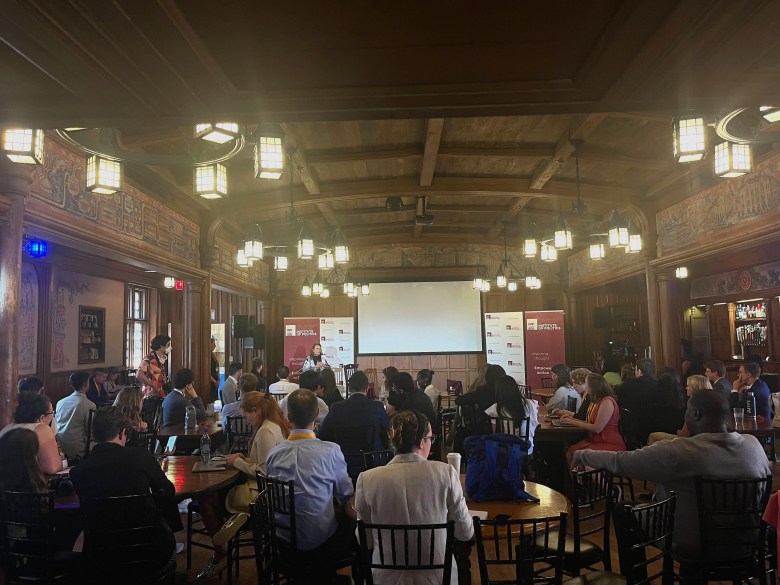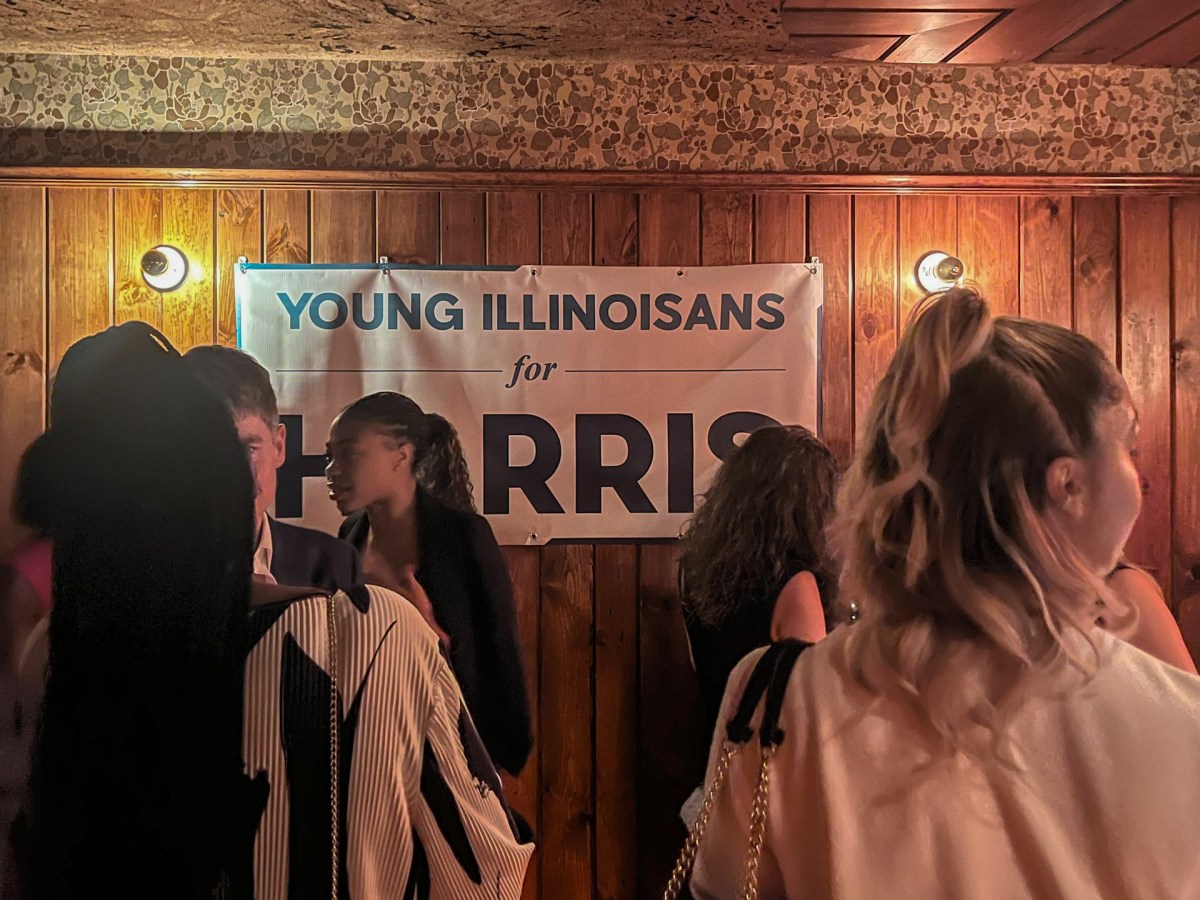MILWAUKEE — As Republican lawmakers target college diversity efforts and Democrats bemoan high tuition costs and advocate for student loan forgiveness, higher education has become increasingly politicized. These issues matter to young voters, which makes their opinions about them important to both parties.
I went to the Republican National Convention last week on a mission to talk to students and young voters about how their experiences in higher education have shaped their political beliefs, and vice versa.
I asked student attendees about the political climate on their campuses, the role of diversity in their curriculum and where higher education is falling short. At the heart of it all, I especially wanted to know what they saw as the purpose of an American higher education.
Conservative students told me free speech was a top campus issue for them. Some said they struggled to have productive conversations with peers who held different viewpoints, and that they became bolder in their political views because of that. Yet several offered ideas for increasing unity on campus and said they believe it’s still possible.
What follows are some of my questions and their replies. (Interviews have been edited for clarity.)

How did you first get into politics?
“My mom is a single mother. She raised me and my sister and taught us a lot of the conservative ideals, like working for yourself, making money, not taking government handouts, and she’s been my inspiration to join the conservative Republican movement.” — Alexandra Leung, a rising junior at Saint Louis University in St. Louis, Missouri
“I came from a pretty conservative family but didn’t develop an interest until 2020. I feel like there was a very big social agenda push that I could not oppose — I didn’t disagree with all of that, but it felt really hard to know that I was living in a system that was really vilifying you if you were against widespread social change.” — Benjamin Heinz, a rising sophomore at Illinois Wesleyan University in Bloomington, Illinois
When deciding what college to attend, what were your criteria? Did your political beliefs play a role?
“I toured a lot of schools where they weren’t open to new ideas about culture. There are a lot of places where the ideas the students have are so dang strong, if you don’t have them, they won’t take you. I didn’t want to go to a place that would reject me for who I am.” — Benjamin Heinz
“I thought about how tolerable the college would be to all students. I wanted my school to match my religious beliefs, and picked a Jesuit Catholic Institution.” — Alexandra Leung
“I like putting myself in uncomfortable positions. I would rather go into places where people disagree with me than agree with me — not because I want to rile them up, but because I want to win them over, not in terms of convince them that my ideas are right but win them over in terms of becoming friends, working with each other, becoming unlikely allies and unlikely collaborators.” — Benjamin Backer, University of Washington, Class of 2020
Related: Interested in innovations in the field of higher education? Subscribe to our free biweekly Higher Education newsletter.
What is the purpose of an American higher education?
“One of the primary roles of higher education is to prepare students for their careers. It should prepare students to do well in society and to perform well as citizens – both things that higher education has almost become misguided in, with the current course offerings and directions institutions are currently going.” — Aaron Carlson, Grace College in Winona Lake, Indiana, Class of 2024
“[College is] the one place that you should feel free to have open debate and discussion. If not, what is the point of college? What is the point of going to higher education, if you can’t just try to decipher the truth for yourself? Universities have to do a good job of instilling that value in students from the second they set foot on the campus.” — Christopher Phillips, a rising senior at the University of Chicago
“A university should care about ideas, not shelter people from ideas. I think that the quickest way to educate people is to expose them to ideas that are different to them.” — Benjamin Heinz
Where is your college education failing?
“We should not know what political party your professor identifies with. It’s really poisoning the American higher education system.” — Alexandra Leung
“A lot of higher education institutions are left-leaning in terms of their faculty and staff. That impacts what students are thinking in terms of their beliefs and [what they] go on to believe later in life, as well, and contributes to narrow-mindedness.” — Aaron Carlson
“My peers don’t have a lot of impact on my career. But my professors do. I plan on going to grad school. Well, how am I going to get in to grad school? My professors better like me. If there are people that are my physics professors that are significantly further to the left than I am, I do feel concerned about what happens if I do start to get more vocal with my advocacy.” — Benjamin Heinz
“Especially in the humanities, you have professors who are not necessarily the arbiters of truth but trying to facilitate discussion and teach people how to think, not necessarily what to think. That’s a challenging line to walk for professors. It’s OK for them to share their political beliefs, but they better make darn well sure they’re giving students from all points of the spectrum equal opportunity to pursue intellectual curiosities.” — Christopher Phillips
Can you have productive conversations with people who have different beliefs on your campus?
“I never have productive conversations with anybody. It’s hard to even have a Republican organization on our campus because we’re so silenced.” — Alexandra Leung
“College was an eye-opener for me, having students who have different ideas but aren’t willing to be challenged on those ideas.” — Aaron Carlson
“I have talked to people who I know are definitely liberal and I have come away learning that with young people, we have a lot of shared principles, a lot of shared perspectives on things that have been happening in the 2020s. Things like corporate power, mainstream media censorship and the consolidation of media narratives. Those are things young people on the left agree with me on. We need more open discourse. People who are actually engaged in the political process on the left are more likely to subscribe to open discourse.” — Christopher Phillips
Related: Culture wars on campus start to affect students’ choices for college
“I moved to a very liberal place in Seattle [for college]. Most liberals I went to school with were so excited that a conservative was trying to lead on the environment, because outside of the confines of partisan politics, most people realize that you can’t, even if you’re a liberal, you can’t do this without conservatives. It really opened my mind to the idea that Americans do want the environment to be nonpartisan.” — Benjamin Backer, now an activist pushing for environmental progress
view from the DNC
Have your experiences in college challenged your own beliefs?
“The topic of racial justice was something I had kind of dismissed. I thought America was fine; I thought our race system was fine because I had never experienced seeing racism firsthand. But I hadn’t realized the generational issue. I still think America, nine times out of 10 or more, gives people the best chance to succeed here, of all races and backgrounds, but because of generational issues and making entire groups of people start at a harder place in society, it makes it more difficult for people to succeed.” — Benjamin Backer
“I’ve gotten more used to what the other side thinks, I’ve talked to a lot of people who think different things. I’ve gained a lot more respect for people who disagree with me.” — Benjamin Heinz
“I was more emboldened in what I believe. I didn’t go into college planning to be an activist, as far as advancing American values. It turned out that I was able to use my role as a student to be a voice for that on campus, something I didn’t see myself doing coming into college, but then through college I had the opportunity to.” — Aaron Carlson
“I became more Republican in college even though I go to a more liberal institution. I think it’s because when I tried to have mature conversations with people who may not agree with me, it just never went well. There was no respect for me even though I gave full respect to them. I think that showed me that I need to fight harder for what I believe in.” — Alexandra Leung
Has DEI been a part of your curriculum or experience in college? Has it been beneficial to your education, or hindered your learning?
“DEI courses are required in my college curriculum and they are adding critical race theory into our education as a mandatory required class. I can see the idea behind them but the way that they’re implemented is more dividing than what they imagined.” — Alexandra Leung
“DEI prevents the most competent, best people being picked for positions. As much as I want to see people as part of a team brought in from every different perspective, I don’t want it to take positions from people who work hard to earn those positions. I saw a little bit of that at my institution. We should judge people on their character, not by how they look.” — Aaron Carlson
Do you see a path forward?
“Young people do crave a degree of intellectual discourse and open debate. I think they do more so than previous generations. You have this caricature of Gen Z people as being intolerant, as not wanting to hear from the other side. While it’s true that the country as a whole is more polarized … you will find people are a lot more willing to speak than this caricature might portray.” — Christopher Phillips
“A big thing colleges could do, they could hire a lot more conservative professors. And admit a lot more conservative students. We need to start broadening our horizons of what speech we allow on campuses.” — Benjamin Heinz
“[On] an issue like the environment, and race and gender issues, conservatives need to show people that they also care about the issues [that those who oppose them] care about. When I told liberals on campus — who hated conservatives — that I was working on environmental issues, almost all their walls came down. They realized, ‘Oh, this person isn’t evil. They have different beliefs than me but the same end goal; they care.” — Benjamin Backer
In August, I plan to talk to young attendees in Chicago at the Democratic National Convention — which will be especially interesting now that President Biden has withdrawn from the 2024 race.
This story about the Republican National Convention was produced by The Hechinger Report, a nonprofit, independent news organization focused on inequality and innovation in education. Sign up for our higher education newsletter. Listen to our higher education podcast.




